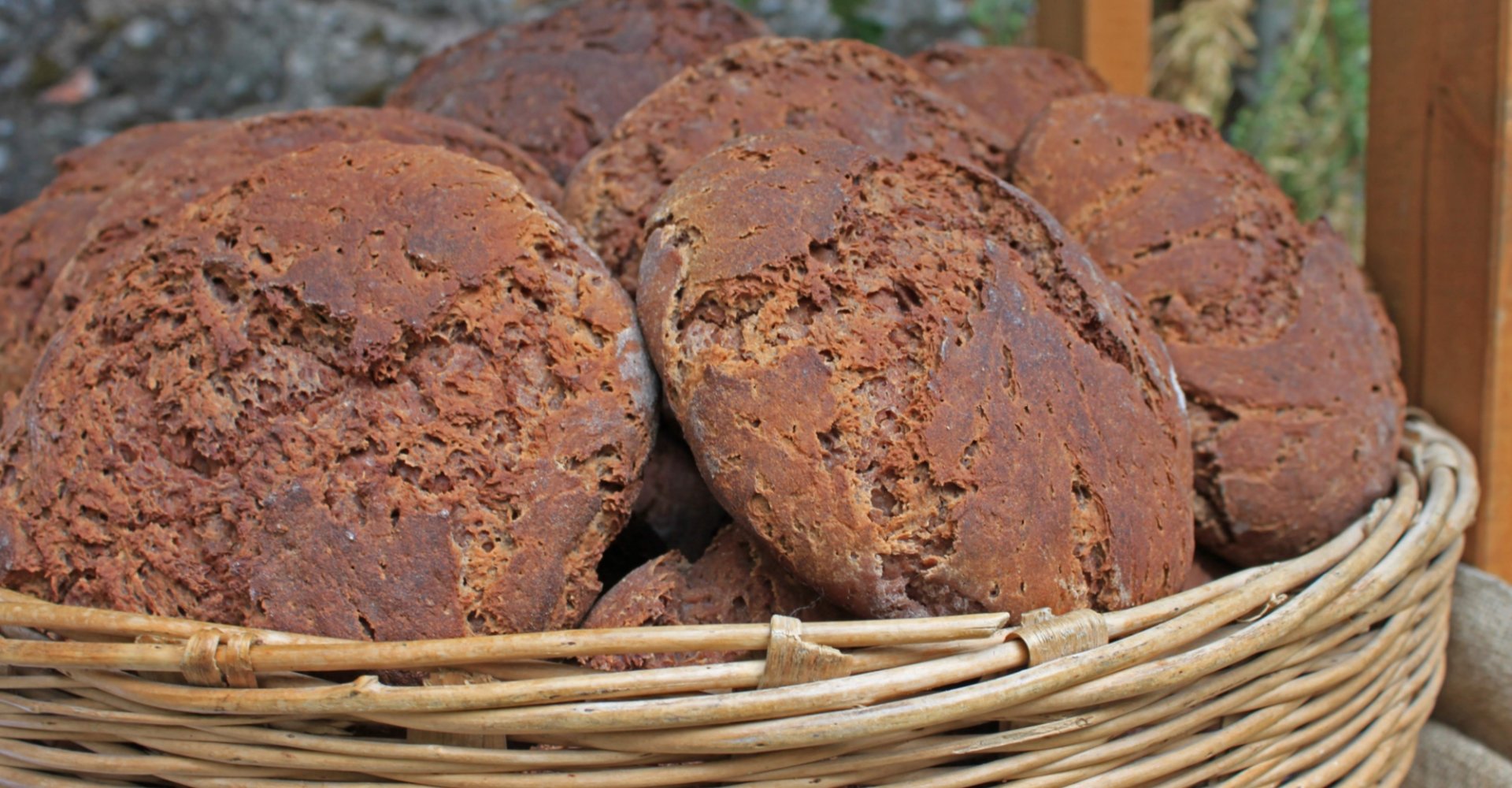Marocca of Casola

Lunigiana PDO Chestnut Flour bread between past and present
Lunigiana is characterized by the presence of numerous chestnut groves, which have always been cherished by the local population. Its fruits and the chestnut flour derived from them have fed one generation after another, both in times of plenty and in times of war and famine, becoming a precious element of identity and staple of the Lunigiana people’s diet.
If the chestnut tree is the tree of bread, a chestnut-based bread that has strong significance in Lunigiana is the Marocca of Casola.
Bread, everywhere, is by definition a poor food. You need a few elements to make it: flour, water and yeast. However, all it takes is to add an ingredient, vary the shape, work the dough for more or less time, and the results can be many and surprising.
Historical notes
The Marocca of Casola was born as a peasant bread, baked in the common ovens in the villages of eastern Lunigiana and made with what was available at the time, that is, a little wheat flour, a lot of chestnut flour, some potatoes and the precious oil. From this mix of ingredients, comes a bread that is not very malleable, in dialect “marocat”, able to keep very well due to the presence of potatoes in the dough.
This chestnut-based bread has been the food staple of the farmers of the Upper Valley of the Aulella Stream, a border area between Lunigiana and Garfagnana, for centuries, and was especially valuable during World War II, at a time when food was scarce.
With the Post-War period and industrialization, Lunigiana, like many other inland areas of Italy, was marked by a slow and inexorable abandonment of the countryside, which led to the decline of many of the gastronomic and social traditions of the rural world that had been refined over the centuries and were passed down from generation to generation.
A fate, this one, that would have also befallen the Marocca of Casola, had it not been for Fabio Bertolucci, a young entrepreneur who at the age of 23 decided to settle in his homeland. First an apprentice at an old bakery with a wood-burning oven, Fabio learned all the secrets of the Marocca until, in 2008, he opened his own bakery in Regnano, a small hamlet in the municipality of Casola in Lunigiana. Currently, his bakery, Il Forno di Canoara, nestled in a fairy-tale setting between the historic passes of the Tuscan-Emilian Apennines and the sharp peaks of the Apuan Alps, is the only bakery that produces the Slow Food Presidium Marocca of Casola.
The Marocca of Casola was born as a peasant bread, baked in the common ovens in the villages of eastern Lunigiana and made with what was available at the time, that is, a little wheat flour, a lot of chestnut flour, some potatoes and the precious oil. From this mix of ingredients, comes a bread that is not very malleable, in dialect “marocat”, able to keep very well due to the presence of potatoes in the dough.
This chestnut-based bread has been the food staple of the farmers of the Upper Valley of the Aulella Stream, a border area between Lunigiana and Garfagnana, for centuries, and was especially valuable during World War II, at a time when food was scarce.
With the Post-War period and industrialization, Lunigiana, like many other inland areas of Italy, was marked by a slow and inexorable abandonment of the countryside, which led to the decline of many of the gastronomic and social traditions of the rural world that had been refined over the centuries and were passed down from generation to generation.
A fate, this one, that would have also befallen the Marocca of Casola, had it not been for Fabio Bertolucci, a young entrepreneur who at the age of 23 decided to settle in his homeland. First an apprentice at an old bakery with a wood-burning oven, Fabio learned all the secrets of the Marocca until, in 2008, he opened his own bakery in Regnano, a small hamlet in the municipality of Casola in Lunigiana. Currently, his bakery, Il Forno di Canoara, nestled in a fairy-tale setting between the historic passes of the Tuscan-Emilian Apennines and the sharp peaks of the Apuan Alps, is the only bakery that produces the Slow Food Presidium Marocca of Casola.
Food and wine
Used to serve slices of toasted bread and gourmet appetizers on grand occasions, or even just as an accompaniment to sweet Lunigiana caciotta or traditional cured meats, Marocca of Casola has gradually returned to the various restaurants and homes of many inhabitants of Lunigiana.
To taste this ancient bread, a trip to eastern Lunigiana and specifically to Regnano, a village nestled between the Apuan Alps and the Tuscan-Emilian Apennines and located along the ancient Via del Volto Santo and the Tea Pass is a must. In October, switched on chestnut drying rooms can still be seen in the village, and the traditional chestnut festival is organized, where one can taste not only Marocca but also other traditional Lunigiana dishes.
Used to serve slices of toasted bread and gourmet appetizers on grand occasions, or even just as an accompaniment to sweet Lunigiana caciotta or traditional cured meats, Marocca of Casola has gradually returned to the various restaurants and homes of many inhabitants of Lunigiana.
To taste this ancient bread, a trip to eastern Lunigiana and specifically to Regnano, a village nestled between the Apuan Alps and the Tuscan-Emilian Apennines and located along the ancient Via del Volto Santo and the Tea Pass is a must. In October, switched on chestnut drying rooms can still be seen in the village, and the traditional chestnut festival is organized, where one can taste not only Marocca but also other traditional Lunigiana dishes.



